#or. roman emperors. specifically those two
Explore tagged Tumblr posts
Text
woke up three hours ago and all I've done is roll around in bed thinking about the Roman Empire
#or. roman emperors. specifically those two#I've had COVID and it didn't give me half as much brain damage as this one film did#God how am I even supposed to go on#I WISH I WAS KIDDING but I'm so incapacitated. What else even matters#booked tickets for th fancypants super high tech theatre to see it again.#now I just wish I'd gotten the tickets for today and not Monday#because how the fuck can I survive until Monday#hello. send help#I CANNOT UNDERSTAND how this even HAPPENED#saw it on Friday then Saturday/Sunday didn't think about it at all#on Monday evening I started having mild symptoms of brain rot#on Tuesday I woke up and it was all over for me#every living second afterwards has just been HOOOO. OHHHH. OOOAAAHHH#gladiator 2#gladiator
20 notes
·
View notes
Text
𝐈𝐬 𝐢𝐭 𝐚 𝐰𝐨𝐧𝐝𝐞𝐫 𝐈 𝐛𝐫𝐨𝐤𝐞? || 𝐌𝐚𝐫𝐜𝐮𝐬 𝐀𝐜𝐚cius 𝐱 𝐟𝐞𝐦!𝐫𝐞𝐚𝐝𝐞𝐫 𝐱 𝐄𝐦𝐩𝐞𝐫𝐨𝐫 𝐆𝐞𝐭a

part one: here || part two; i’ve been the archer
summary_ after returning from Egypt, you are set to marry your half brother Geta. When you fall in love with General Marcus Acaius, your brother tries everything to prevent you from slipping away from him.
warnings_CRINGE, age gap!, semi incest (do not romanticize irl) reader x Geta, drama, angst, VERY quick love confessions, implied SMUT +18
update nov 2024: my phone changed Acacius for Acaius, I’ll change it on these days bye
NOTES_ who’s afraid of little old me?, I just wished there were gallows in Ancient Rome, listen to my awful playlist for Marcus and the classic I have for Pedro bb.
♪ ♫ Pedro playlist + Marcus’s playlist ✰ Index (+ fics here)
If there was something you’d never miss… were the carmine sunsets. Those lasted more than usual. That kept the beginning of the night warm and made you the silent promise of another good day by the following morning.
It had been easy for your father to send you away as soon as your mother quit their marriage. Your brother was a big inconvenience and a hidden mistake that shattered your little wealthy family. Under the cautious look of the Roman Senate, your parents were still bonded in a strong marriage. But the truth was that your father never truly loved the woman who gave birth to you. Which led to your mother leaving for Egypt, a Roman Province. Soon after her departure, you were sent to Alexandria too.
Each day was a boost to your status. Learning a vast variety of languages and dialects, learning different types of dances, being able to handle weapons, and gaining control over the Egyptian cities, to help your powerful father; The Emperor.
You barely missed Rome. Your mother was a cold Empress that loosened all the knots your father could have tightened around you. Growing up used to the Egyptian parties, drinking the finest beer and bread. Taking occasional lovers since virginity was not a necessity for marriage in Egyptian society. One of those lovers specifically, was a tall warrior with sun-kissed bronze skin that transformed you into a woman in every aspect you couldn’t discover by yourself. It was a shame when he died after a bad injury during war.
In the present, being in your first years as a young woman, things were likely to change, and you were very aware of it. That didn’t stop you from having the time of your life in the vivid city of Alexandria. With very few friends, a dead lover, and a dream.
Every night you savored those carmine sunsets to pray to Venus. Perhaps your dream of finding a true love hadn’t happened yet due to praying to her instead to Hathor; the god of love in Egyptian territory. Nevertheless, you intended to marry a man who was ridiculously, recklessly, and borderline obsessed with you. You wanted to live the broken dream of your mother.
Until desires were abruptly paused one night. When you received a letter from your father.
“A letter from the Emperor. It is the wish of your father to have you back in Rome” Your walls crumbled into pieces. The face of shock was splashed all across your face as you listened to your mother.
“What motivated his decision?”
“I can assure you, I don’t know, my child,” your mother says vaguely, tending his favorite flowers inside the palace.
���Do not lie to me, mother” she sighs and suddenly, she starts crying. You don’t know what to do, but the sight unsettles you.
“He wants you to marry Geta…” your eyes get impossibly wide open, and you gasp in shock.
“My brother?” your mother nods. You pace back and forth, wondering why and how could your father come to that conclusion.
Although you were used to attending weddings in Egypt that came from a mother marrying her son, to a brother marrying his sister, it was… awkward. This was the boy that destroyed your family, the boy that would take half of your rights as heir was meant to be your husband and father of your children.
The mere thought scares you.
“Will you accompany me?” It’s the first thing you come up with.
“I must stay here since Egypt won’t have you now” You frown at her words. But your throat tightens, defying to produce tears that quickly threaten to spill everywhere.
“Be strong, remember everything I’ve taught you. No men will defy the tenacity of the emperor’s daughter.” you nod, your eyes prickling with fear that explodes in your chest.
“And in between, find the love I couldn’t keep, no matter what, y/n…”
“I’m seeing you again, Right, mother?” she nods, giving you a cold hug.
“I’ll always be here…”
For the first time, the carmine sunset does not bring you peace. Your mind is edging towards collapse as you approach Rome. As the light of the light leaves, you question everything. So many questions and nothing of time.
…
There were no shattered crystals after dinner as you expected. Your brother Geta welcomed you in Rome with excitement and it confused you even more. He gave you a short and personal tour of his newest garden and prepared the finest banquet made by all of the servants.
Geta is a sole copy of your father. Same mannerisms and style. Only behind his attentive look, you were aware of the sadistic man who talked to you with respect.
“Where is Father?” you ask him, sipping at your wine.
“An important meeting surged. He’ll join us tomorrow, we are preparing vast festivities”
“Festivities for what?” he smiles, you don’t like how compassionate and polite he’s being.
“Our marriage, soror” The heavy makeup on his face does everything to hide the truth of the narcissistic man he is.
You could swear he hated you because your mother was the sovereign empress and you the rightful heir. Your father just happened to have two wives and two kids at the same time.
And despite everything, you didn’t hate your brother. You despised her mother for drawing your own apart from your father. For convincing him to send you away from your solemn fair future. For transforming your brother into some incompetent who seemed to have a hunger for chaos and madness.
“I must thank you, for welcoming me… despite our background differences” It takes him aback. Geta expected a disheveled girl, a rebellious female who followed the ways of the savages; the Egyptians. But he encountered a bright and marvelous sister who tried to act with peace after being so far from home for so long.
“I wished we could’ve grown together, like a united family” you admit coldly, avoiding the whole marriage issue.
“We will be a family, y/n. I’ll make sure of that” he says hiding his lips in his cup of wine and it sends shivers running down your spine.
Geta sees how you stand up and politely push forward the chair you were seated in; excellent manners.
“As a tradition of mine, I’ll see the sunset and pray before going to rest. Please excuse me….” your brother nods, still processing your words as you leave the imposing place where you were born. You desperately need fresh air.
Near there’s a meadow with empty spaces. It’s just a piece of land that soon would probably serve to build another coliseum.
One thing is noticeable. Sunsets in Rome aren’t carmine… they are mauve. And for some reason, you can’t feel peace.
But you hold tight to your dream. Your happiness is what you’ve prioritized ever since a teenager.
That’s why you hadn’t failed a day to pray to Venus.
Venus, hear me, please. You whose care, throughout all the centuries, the unions of men and their lovers have been placed, what, I pray, have I come to merit? Release me from this uncertainty, gift me a lover, who will warm my heart for eternity. Venus, save me from the hells of my ancestries.
Someone touches your naked shoulder, it makes you gasp in horror.
“I didn’t mean to scare you.” someone says. When you turn around, you are facing a man who’s incredibly taller and broader than you. He’s significantly older than you, but he’s graceful. The second he takes to appreciate the sunset as well is your chance to study his profile. Gorgeous classical profile.
“Excuse me, but… Who are you?” you ask, moving aside, leaving his hand that rested on your shoulder in the air. He noticed it.
“General Acacius… I wondered why a woman was here all alone” you know him. He’s the most successful general your father ever had. He was a concise warrior, even considered a killer.
Somehow, you couldn’t help but find some sweetness in his deep voice. By knowing him for just a second, you felt comfortable by his side.
“I take pleasure in appreciating the sunset…” your soft features intrigued him. You looked slightly different than most of the women he sees in Rome.
“I haven’t appreciated the sky since I was a kid”
“What a shame, General. You would find some peace hidden between the clouds” Your accent was slightly colder than everyone’s. You didn’t have the golden hair that usually meant power. He was infatuated and tremendously interested in the woman he was facing.
“I must know where you come from…” he says, paying attention to your eyes. You smile, touching the little pearls that fall from your pale blue dress.
“I was born here… but circumstances made Alexandria my home. I arrived last night…” his eyes show surprise. He analyzed your bracelets, made of pure gold. You had a leaf crown with tiny sapphires that shimmered around your head. It wasn’t hard to tell who you were.
“majestas… you shouldn’t be here” he mutters and you don’t even flinch.
“I can assure you, General Acacius… I rarely find myself in the position of damsel in distress” he chuckles and you are relieved to see he doesn’t carry a ring around his finger. It was happening so fast, you wanted to know everything about him.
“You may call me Marcus. Except when we are in the presence of your father or brother” you remember you are supposed to marry your brother. But it wasn’t official just yet. And you were quickly falling for this older and gorgeous General.
After a sweet battle or glances, he has to put down his sword. You notice the details and the signs of years of use it has.
“Is this the weapon you master the most?” he nods, noticing the dry blood around the edges.
“Indeed… I learned to wield it before I even went to school” You smile, nervous but eager to throw your next comment. He was speaking very softly towards you. But it was obvious that he was a reserved and serious man.
“I use the spear and axe” Your revelation leaves Marcus surprised. There were very few female gladiators, most of them being treated worse than common slaves. No female in the Roman hierarchy wielded weapons.
“You truly are one of a kind, majestas” As the emperor’s daughter, you weren’t supposed to ever wield a weapon. Contrary to that rule, you were required to learn about politics. In Egypt, you were free.
“Oh, don’t call me that… my name is Y/n”
“Precious name…”
His smile mixed with yours burst in an obvious mutual flirtation. After talking for about two hours, the moon is the only witness in the dark meadows, where Marcus and you kiss until your lips are swollen and he has hydrated him after days of dryness. He promises to keep close to you as his fingers slip under the fabric of your tunic. You swear to welcome his touch no matter what as your hand palmed his girthy length under his heavy armor.
That night both of you seal your fate. That night Marcus Acacius ignites a vivid fire inside your heart.
…
Often, you wondered if candles could run out due to the excessive use of them each night. At least thirty candles are illuminating the place. You patiently wait in the room Marcus had in the Emperor’s palace, seated on the edge of the bed. When the General comes out, he spots you at his resting place. Immediately, you frown at him.
“You said it was a minor injury” There’s a lot of dry blood on his shoulder. He had taken a bath… but the injury was there, uncomfortably lying over his skin.
“It is a minor injury.” He assures, sitting beside you on the bed.
It’s been only a couple of days since you met him… and you are already too keen on him.
“There are no gladiators where I come from. Only warriors… Generals only command their soldiers. We never used weapons as a spectacle”
“I’m starting to believe Egypt is a better place than Rome” you shrug.
“I miss my home. I miss the freedom. I can’t marry Geta…” you admit out loud for the first time. Marcus huffs, he doesn’t have a problem with letting you know he is jealous.
“Right… the wedding.”
“I have to marry him after all. Only that way I could share the title of Empress with him” Marcus sighs tired.
“Am I descending into madness for these strong feelings I have for you?” you turn to look at him. Your hand moves to the end on top of his.
“I look into your eyes… and I feel safe, Marcus” you admit, straddling him. Your fingers trace his beard as you lean to kiss him deeply. He reciprocates and holds your hips steadily.
It’s a wild moment to openly share carnal passion, but neither of you cares. You push him against the feathery pillows and continue kissing. His hair gets tangled around your fingers and his forearms and hands have disappeared under your dress. You start throbbing and he gets hard. But the moment is suddenly interrupted by some footsteps near the room. In a blink of an eye, you get away from Marcus and he stands up from the bed too.
“Use the trail at the end of the hallway. I’ll see you tomorrow, satis” he says, kissing your forehead before you quietly leave his resting place.
Some guards were wandering around the place as usual. You skillfully pass by them, using the trail Marcus told you. But it’s dark and very quiet, not even illuminated by torches. Your sandals barely make a sound against the floors.
So it’s a huge surprise when a hand covers your mouth and the next thing you feel is getting slammed against the wall. It didn’t hurt you but it was violent.
You gasp for air and encounter your half-brother. He has his golden crown and velvet robes, his face almost clean of tints that weren’t his natural skin.
“What were you doing with Acacius?” You frown.
“I don’t know what you’re talking about” his ginger hair is the only thing that shines in the dark trail.
“Quit the lie, soror. Has he made you impure?”
Oh dear brother, if you knew my purity has been gone for many years. But the truth was that Marcus hadn’t claimed you his yet.
“No. And it should not be a matter of importance to you” he chuckles.
Geta isn’t an idiot. He had seen the way Acacius looked at you during dinners. He noticed you came back to rest later than usual. And it was making him boil in anger. His disgust towards you before your arrival was strong. But after you turned to be a delight for his taste, Geta was burning for you.
“Oh, but it is a matter of importance to me. You are my future wife” he says, threatening to seal his lips with yours. The arm that was holding you still sneaked around your waist, applying a little too much pressure.
“Do you think I like the thought of other men touching or even smiling at you?”
Oh… so he was jealous.
His lips gently brush your neck as you set your eyes on the moon, waiting for the moment to be over. His touch is vicious, possessive, and harsh. The trail his lips have followed from your collarbones to your throat ends in your chin, mere inches away from your lips.
“If we can even consider this love… you have an odd way of showing it” he lets you go, the cocky smile on his face never leaving.
“Love or not… you are going to be mine”
“I’m also the heiress of the Emperor. We’ll see about that, Geta.” You spit bitterly, literally running away from him.
You have converted into an enemy for him. And you had to be ready to walk cautiously. Because you had changed your mind. Perhaps you would lose the crown… but weren’t going to marry him.
…
You missed dates so badly, but then the following morning, when a plate of them was included in the morning, you couldn’t resist. You are eating alone. Until the doors open and your father appears followed by two guards.
“Father…” you stand up, making a reverence to him. He smiles, extending his arms to hug you.
“I have wonderful news. We’ve arranged an encounter for you to demonstrate your abilities in combat” You are extremely confused.
“What?” Your father sighs, breaking the hug.
“I’m aware you performed in celebrations back in Alexandria. This is just the perfect opportunity to show the senate and council you are a prepared lady to receive the title of Empress one day…”
“Father… as much as I appreciate the intention. I’ve performed as a way to train for battle; gods forbid us from having to go to war, but… here, your soldiers and slaves fight for the mere feeling of feeding the greediness of hierarchy. I can’t do that…”
You weren’t a target for the empire to show off. You were more than just a woman with the ability to carry a weapon. You valued your freedom. And ever since arriving in Rome, day by day, you feel that you keep slipping away from it.
“The decision is taken. Heavens know why but the official announcement of your engagement with Geta remains being delayed. Hence, I won’t turn the Senate and council against me when there's no need. I may only wish you good luck, dear” You remember Marcus. He could have voted against the encounter. He was the General.
Suddenly you are bursting in anger, making the coldest reverence to your father as he leaves.
Your angry steps lead your way to Marcus. You found him taking a rest on a nearby balcony. When he spots you, his smile vanishes.
“You couldn’t impede that brainless idea of me participating in a combat?” Marcus has to sigh, placing his hands on his hips. He was expecting your anger to be honest.
“I couldn’t say no. If it did, they would suspect. I already have your brother behind my back all the time” You can fight him because he’s right. But it doesn’t dissipate your anger.
“You are going to be fine. I may be able to arrange the rules. I can choose the gladiator that will fight you, but your father and brother have the last word. What weapon do you want to use?”
“The spear…” he nods.
“Female gladiators tend to wield the bow and sword. You can easily disarm her…” you are not scared, you are just frustrated.
“Teach me the methods warriors use here…” you mutter. Marcus nods, taking your hand and giving an apologetic look.
“You will win, my dear.” His fingers place some strands of your hair behind your ear, it melts your anger and transforms it into peace. You want to scream how much you desire him. But you must retain your feelings given the hatred days you were living.
“Let me thank you for the training in advance, General,” you say, getting on your knees.
“Good girl…” Marcus whispered as soon as your tongue started working on him.
…
The usual crowd in the Colosseum couldn’t be compared with the amount of screams and cheers from the people watching the emperor’s daughter fighting one of the greatest female gladiators in Rome; Calista.
The sandy floors were covered in an elegant tapestry that marked the square where the show was occurring.
You are sweating, there's blood running down your chin and you can’t breathe correctly. Calista was ordered not kill you, but for some reason, she seemed to be personally trying to knock you out.
She had a helmet and armor in gold and red. But it was hard to deny everyone was invested in the attire you wore. A golden mask of Neith, the god of war that covered your face and a gold vest and bare shoulders. Everyone thought you were insane for that.
You remember all the things Marcus told you. Soon after your father started the encounter, you learned gladiators were blinded by the necessity of seeing blood on their rival instead of following a technique of combat.
Calista’s sword is sharp enough to give you a long cut by the movement of a soft swatch. You yelp in pain and she kicks your ribs, making you fall to your knees.
Marcus stands worried from his seat, but he soon returns to his place after making eye contact with Geta, who sends daggers with his eyes. Marcus understood your brother was insane when he disapproved of the gladiator he had chosen. Geta picked the most sanguinary and violent warrior to fight you.
Marcus couldn’t do anything. But he was impressed by your skills. He sighed with joy everytime you slipped from Calista’s touch. Even your father was displaying a face of proud.
But it’s not the same for you. You enter in panic, knowing you are at full mercy, almost dropping your spare. Your father is about to stop the encounter. The crowd is impossibly louder. You want to throw up. The sweat mixed with nausea, the cold air of the night, and the dryness in your throat are too much to handle. But you refuse to lose. With the sharp edge of the spare, you cut Calista’s calf. She’s startled, ready to strike back when your leg pushes her on her back. The heavy sword she carries makes a loud noise. Her skull crushes against the floor. It gives you enough time to stand, place your foot in her throat and point the spare against her forehead, ending the encounter.
The cheers are disgustingly excessive. But you’re done. You did what your father asked. You take off the mask and look at your brother in anger. Geta offers you a fake smile. He was surprised to see you were able to slip away, from his evil plans, from defying your father.
You offer your hand to Calista, but she refuses. She looks like she wants to kill you. But she only reverences your family and leaves.
Everything is forgotten when you set your eyes on Marcus. You want to smile and run to his side. He sees you with adoration. He sees the reincarnation of Psyche in you. A woman who Marcus swears it’s even more graceful than Venus and Persephone themselves.
Marcus Acacius makes a decision; He must marry you.
…
After a banquet, your bones and muscles ache with each movement you make, but you run towards Marcus. You need to see him after such a long day. He waits for you in the secure spot of the farthest tower. His light robes and leaf crown are securely dressing him when you spot him. The gold in his attire matches your bronze bracelets and indigo dress.
He’s the man you desire. He’s the man that had offered you a real demonstration of affection. He wasn’t trying to manhandle you like everyone before did. It’s more than enough to make you think your prayers to Venus have worked. You collide in his chest, giggling.
“I love you”
Both of you say at the same time. It leaves you shocked. Marcus smiles and you have to kiss him to believe it’s real.
“I promise you… we’ll be together” you nod dying out of happiness. He kisses you back and you feel you want to cry out of happiness.
What feels like a second was an hour of kissing.
And Geta was able to witness some of that time. Drowning in a monstrous wave of jealousy, he ran towards the Emperor to accuse you of adultery. But it was too late, your father was out of the city for the rest of the day. Geta is beyond enraged with the news. So he sends part of his father’s cabinet to a brothel, hoping his evil plan would work.
Later, when he finds you going towards the garden, he fastens his pace to harshly grab your forearms and stop you.
“That General is no good for you.” He spits with disgust as you squirm away from his touch.
“Neither are you” you fireback, stepping backwards.
“Go find him. You should know he just uses you to have our father’s approval. So I insist you, go find him and see what kind of man he is after you leave his bed” You raise your hand ready to slap him, but you don’t. You simply turn away and keep walking.
Geta’s words echo through your mind. You question him, valuing the honesty of his words. Marcus was a man after all. There wasn’t a perfect man nor a perfect woman, but you liked to believe there was still good in the hearts of the people.
Perhaps Marcus would be disappointed by your mistrust. But the uncertainty of his loyalty was something you couldn’t risk.
That night, you go out in a linen cloak, hunting the man you love. The guards won’t know you went out prowling around the city.
It’s late, but not for the city. Although is not crowded, there are a lot of people in the market. You let yourself wander across the place. There’s handmade stuff that women and kids sell. It makes you think about power and how not all of the people had it. If you ever became Empress, you wanted to see a prosperous and bright city. You want to ensure them with security and peace. You want to get rid of eccentric stuff, including gladiators.
The sound of music along with laughter draws your attention to a specific place. At first glance, you think it’s a tavern. But as your feet made it to the entrance, you gasped in shock. There are more men compared to women. The females are scattered around the place. Some feed grapes to men. Others dance and use their bodies to charm. All of them have their chests bare, showing their breasts and silver bracelets. It shocks you to see some of the females naked, kissing between groups of four or more and almost fucking them at the sight of everyone. The wine smells cheap, the whole place smells like sweat and sex combined.
You see from afar a large table of men. Your eyes look at the head of the table and it causes a great mix of confusion and intrigue. Because it’s your Marcus who’s seated with those men. He talks and looks seriously intimidating with his sword resting on the table. Your heart starts racing as a woman gets closer. She raises her hand to touch him. Marcus turns to look at the woman. She has short blonde hair, pale skin, and purple fabric that barely covers her body. Your eyes water at the sight. Your lover, who promised find the way to be with you hours ago is there, surrounded by naked women and you can hear him cursing. When the blonde woman is about to sit in his lap, you leave the place running away. There’s not even time to tear yet, you are completely covered in shock and disgust.
Soon you are back. You gasp for air, opening the doors of the place you call home. Two guards let you enter and you throw your cloak to the floor. When you look at the end of the long hallway, you spot Geta talking with his counselor. At the sigh of you, he indicates the man to leave. You want to leave him behind so bad, you avoid his eyes but it’s his voice that stops you.
“I told you so…” he says with an evil smile.
“Be quiet…” his laugh is loud and it angers you more.
“He doesn’t care about you. Acaius only cares for power. He could never love you-“
“SILENCE!”
You push him towards the granite bench behind and he is taken aback.
Even more when you lean to smash your lips with his.
It’s disgusting. There’s no care, only two individuals fighting for control in the lips of each other. Even the beetroot juice you applied hours ago has transferred to your chin and Geta’s. His hand is resting with pressure on your nape, and you slightly pull his hair, making him groan before kissing you even harder.
Just when you are about to sit in his lap, you stop. You look at him in horror. There’s no way you just kissed him. That you almost succumbed to his touch. But you remember Marcus with that woman. What were you doing?
Geta sees you quietly crying before standing up from the bench and watching you bolt.
You run to the meadows. The place where everything began. And at that moment, you realized you had completely failed.
Fighting in that encounter with Calista for what? Unnecessary approval of men who would surely die before you birthed your first child.
You pleased your father to live in peace for what? To carry the weight of a narcissistic brother and a traitor lover.
Your prayers were in vain. The love you wanted to find was over before it even started. Because it wasn’t real. You should’ve stayed back in Egypt. Maybe you should have married Geta on the first day. At least whatever he did to hurt you would have a payback. But with Marcus, it resulted in an excruciating pain that you had never felt before. Which makes you feel so ignorant and brainless. All that ego your mother had helped you build collapsed at that moment. You just wished for a remedy. Which for sure didn’t exist. But there must be a way, to make everyone feel at least a drop of what you have.
—————————————————————
part two or what? (Literally didn’t add the part I wrote for the sneak peak lol)
taglist: @drewharrisonwriter @my-dearest-agent @yellowheartz @spookyxsam @natasharomanoffsmotorcycle @uncassettodiricordi @kluvspedritooo @littleblackcatinwonderland
#pedro pascal x reader#marcus acacius#marcus acacius x reader#gladiator 2#joseph quinn x reader#emperor geta#emperor geta x reader
532 notes
·
View notes
Text
Marcus Acacius x The Huntress 🏹

Rating: Explicit
Archive Warning: No Archive Warnings Apply
Fandom: Gladiator (Movies - Scott)
Relationships: Marcus Acacius/You, Marcus Acacius/Reader, Marcus Acacius/Original Female Character(s)
Characters: Marcus Acacius, Publius Septimius Geta, Marcus Aurelius Antoninus | Emperor Caracalla
Warnings: Explicit Sexual Content, Explicit Language, Smut, Dark, Ancient Rome, Gladiators, Historical Fantasy, Dubious Consent, Oral Sex, Rough Oral Sex, Vaginal Sex, Rough Sex, Orgasm, Forced Orgasm, Mythical Beings & Creatures, Bondage, Non-Consensual Bondage, Dark Fantasy, Marcus Acacius Lives, Mentions of Myth & Folklore, blood, horror
Summary: You hunt because it’s in your marrow. Left to the wilds as a child, you learned to survive before you learned to speak. Now the forest bends for you. The trees whisper your name in the hush between wind and kill. You wear your dominion proudly: scaled hides stretched over muscle, wolf pelts draped across your shoulders, a crown of antlers rising like thorns, and a mask stitched from the skins of beasts you gutted with your bare hands. When the Roman stumbles through the brambles, armor caked with dried gore, breath ragged in the cold, your axe hums like a live thing in your palm. He has a body honed by war, broad and brutal, reeking of conquest and challenge which makes your blood sing for more than just the kill, your cunt to clench with a need no blade could ever satisfy. Perhaps death can wait and he can serve a better purpose, something warm and filling to fuck the edge off your carnal appetite.
Words: 1377
I’m so excited to share it with all of you. This is the first time I’ve written a story from a specific POV for a challenge, and it was an amazing experience. Thanks @almostempty and @gothcsz for letting me be a part of this challenge!
I hope you enjoy it as much as I enjoyed creating it. Don’t forget to leave kudos and tell me what you think! This story is also available on AO3.
Marcus Acacius x The Huntress 🏹
Stories were passed down from generation to generation—tales travelers told around campfires on cold nights. Stories about the forests sprawling on the outskirts of Rome. About creatures that lived there. About savages who grew up in the woods, far from civilization. It was said that their mothers had cast them there as bait, as newborns, to hide them. Unwanted births from single mothers, harlots, or the result of forbidden love affairs. They were called the savages, but you wouldn’t find these tales in ancient songs. No one dared sing them, as it was said these savages were children of the devil, and singing about them would bring evil upon the singer and their loved ones.
These stories reached the twin emperors Geta and Caracalla, whose tyranny ruled Rome. They decided to send an expedition into those forests to verify the tales, with one rule: if the savages were found, they were to be killed without mercy, regardless of age or gender, for it was also said they tormented travelers who dared to cross those woods.
The men were sent off with honor. Among them, leading the expedition, was General Acacius, a seasoned and strong 40-year-old man of war. By order of the emperors, he left behind his new wife to embark on the mission.
At dawn, the fifty soldiers rode out, each on horseback. Reaching the forests would take two weeks, but they wouldn’t travel directly—they planned several stops to recover their strength. The first leg of the journey took them through green fields and harvested wheat, but as they traveled further and drew closer to the forests, the temperature dropped. Winter crept in steadily.
Their final stop was at the forest's edge. The soldiers set up camp there. Towering and robust trees loomed majestically behind them, reaching toward the heavens. The men split into two groups: one would stay to guard and rest at the camp, and the other would venture into the forest before nightfall.
General Acacius entered the forest with the second group on foot, leaving their horses behind. As soon as they stepped in, the dense foliage enveloped them, hindering their path. The branches and treetops formed a high canopy, blocking sunlight. Only the occasional ray managed to pierce through, creating a dim and eerie atmosphere. Every step echoed, the sound of leaves and twigs beneath their boots blending with the distant songs of birds. Swords in hand, they advanced cautiously, alert to any movement or threat lurking in the forest.
With each step, they delved deeper into the forest's heart, and the savages noticed the intruders. Ambushing from behind trees, the savages launched arrows, striking down soldiers who fell to the ground like flies. Blood sprayed as the arrows pierced flesh. When the general saw his men fall, he began to run toward the forest's edge, unnoticed by the savages who assumed he had been killed.
Distracted by his escape, the Roman didn’t watch his step and stumbled into a bramble thicket. His armor was smeared with the dried blood of his fallen comrades, and his breath came in short, cold gasps. Hidden behind the trees, you watched him, your axe humming in your palm like a living thing. You studied him closely—a body honed by war, broad and brutal, reeking of conquest and challenge which made your blood sing for more than just the kill, your cunt to clench with a need no blade could ever satisfy.
You thought perhaps death could wait—perhaps he could serve another purpose. You approached him, axe in hand, noting how he was tangled in the brambles. He looked at you, raising his hands in surrender.
"Hey. I won’t hurt you. Please, get me out of here," he said.
"Mine now," you said, your grasp of his language limited.
“Ugh?”
Drawing closer, you cut through the brambles with your axe, freeing him. He stood, towering but hesitant.
“You won’t leave,” you said, pointing your axe at him.
“All right, all right. We can negotiate,” he said, hands raised.
“No negotiation.”
You grabbed his arm, feeling the strength of his muscular frame beneath your fingers. Your long, dirty nails dug into his skin as you led him to the cave where you lived. There, you tied his hands behind his back and sat him down on a pile of animal pelts that served as your bed.
"Listen, you don’t have to do this. If you let me go, I promise I’ll leave and never return."
“No.”
“Okay… what now? Ugh?”
Without responding, you knelt before him on the makeshift bed and began desperately trying to remove his armor, feeling your clit throb, begging for stimulation. The Roman shifted, trying to stop you.
“Wait. Wait, what are you doing?”
“No.”
“Wait. Is this what you want?”
You paused.
“Yes.”
“What’s your name?”
You didn’t answer and immediately continued, now lifting the armor covering his thighs along with his war toga, revealing his underwear, his hard, erect member straining against the fabric. Your right hand slid over the cloth, feeling him. You bit your lip as you felt his rock-hard cock. It had been so long since you’d felt this, and carnal desire was consuming you. Your clit pulsed, on the verge of exploding, your skin flushing red with the heat of the moment.
The general bit his lip too, reacting to your touch.
“Promise me you’ll set me free afterward,” he said.
“Promised,” you replied with a sultry giggle.
You pulled down his underwear, watching his cock spring up, his balls bouncing as they were freed. Standing, you shed the furs covering your body, leaving yourself completely naked before his eyes.
You approached him, your lips close to his, pressing your wet, hairy pussy against his cheek, teasingly close to his mouth, hinting for him to lick. The Roman understood and turned his face. You spread your legs, and his face disappeared between your vaginal lips.
You felt him licking and sucking your clit at a steady, fast, intense pace, almost uncontrollable, as if he were unleashing all his frustration from being kidnapped onto your pussy. Moans escaped your lips, beyond your control. You loved what he was doing. It was clear he had experience eating pussy—this wasn’t his first time. You thought only the gods could do it like this. Your hands gripped his shoulders tightly. You never wanted it to end, but you pulled away before reaching climax, wanting to continue the game.
You straddled him, taking his entire cock inside you, and began moving up and down, bouncing steadily, your arms around his neck for support. Your rhythm was pushing you both to the edge. The Roman groaned, his face flushed, his breathing ragged, unable to touch you with his hands tied behind his back. You felt it too, the impending explosion. His hips moved in sync with yours, each thrust bringing you closer to the limit. The wet sounds of your pussy against his cock echoed in the cave, mingling with your moans. Every so often, your eyes locked intensely. You didn’t kiss him, nor did you know what kissing was, and he didn’t try either.
Then the moment came. He filled you with his seed, his warm liquid spilling inside you with a final, trembling thrust. You released your warm juices mixed with urine. Both of you trembled, still pressed together. When you regained composure, you slid off him and stood. His cock softened, glistening with your juices. You cleaned yourself and put your furs back on. Then you approached him from behind and untied his hands. You kept your word.
The Roman stood quickly, pulling up his underwear.
“Will you come back?” you asked, a hint of sadness in your voice, knowing you had to let him go.
“I promise I’ll try. I enjoyed your company, despite everything,” he said with a warm smile.
“Me too,” you replied, mirroring his smile.
The general looked at you one last time and left the cave. Night had fallen, the sky blanketed with thousands of stars and a full moon. You stood at the cave’s entrance, watching him walk away, guided by the starlight and moonlight, the memory of your shared moment lingering until his silhouette faded into the horizon.
#EAT!2025#ao3#ao3 fanfic#ao3 link#challenge#ao3 writer#creative writing#writing#marcus acacius#general acacius#acacius x reader#gladiator ll#gladiator ii#gladiator 2#gladiator movie#emperor geta#emperor caracalla#geta and caracalla#pedro pascal fic#pedro pascal fandom#pedro pascal#pedro pascal smut#pedro pascal x reader#pedro pascal x you#marcus acacius x you#joel miller#ao3 author#joel miller smut#joel miller x you#joel miller x reader
107 notes
·
View notes
Text
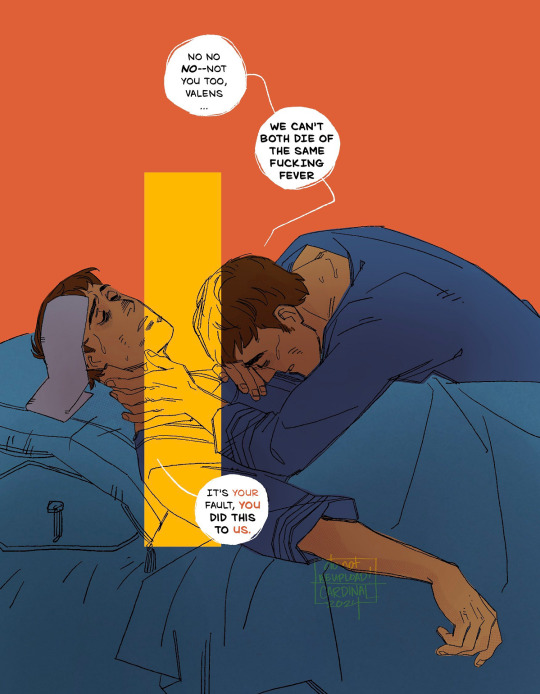

Then, on his arrival in Constantinople, after much counsel with himself, considering that he was already unequal to the amount of pressing business and believing that there was no room for delay, on the twenty-eighth of March he brought the aforesaid Valens into one of the suburbs and with the consent of all (for no one ventured to oppose) proclaimed him Augustus. Then he adorned him with the imperial insignia and put a diadem on his head, and brought him back in his own carriage, thus having indeed a lawful partner in his power, but, as the further course of our narrative will show, one who was as compliant as a subordinate. No sooner were these arrangements perfected without disturbance than both emperors were seized with violent and lingering fevers--
AM 26.4.3-4
this was one of those illustrations that was originally supposed to be a 5 page comic until I realized I don't know anything about later roman empire architecture or visuals or art or anything, so we'll revisit that later. maybe
for right now though, these two are fascinating. we have two brothers acting as one body, even becoming ill in tandem with each other, it's giving This Throne Is Cursed. like, the last time I read about emperors coming down with life threatening illnesses, it was Caligula, and that moment in his biography marked a very specific tone shift. I spent the rest of the (first) time reading about Valens and Valentinian waiting for something comparable to Caligula's reign to happen lmao (Dio 59. 8. 1-2)
and since Caligula was already on the mind, I started thinking about Tiberius: I think he would've loved these two since he had a whole thing about twin-ification and brothers and etc etc etc. ofc, Rome is both a Mouth and a Tomb, so it's going to go badly for someone/everyone eventually, but honestly I think that Valentinian and Valens were the best we could've hoped for. like it could've been so much worse
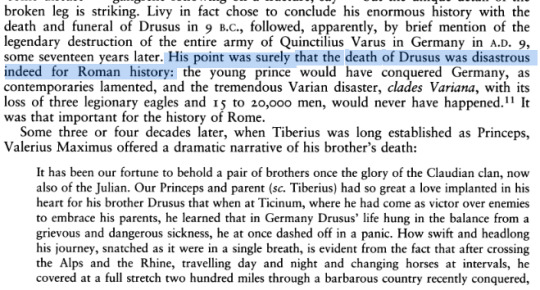









Tiberius and the Heavenly Twins, Edward Champlin
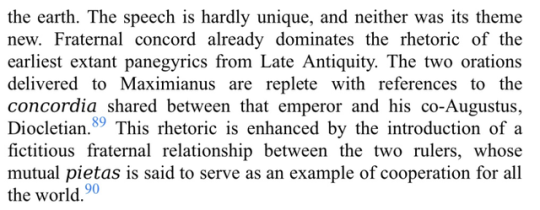
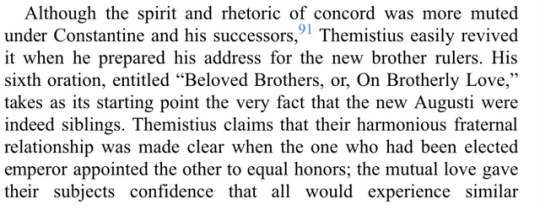

Failure of Empire: Valens and the Roman State in the Fourth Century A.D, Noel Lenski
⭐ I have a tip jar (ko-fi)!
⭐ and other places I’m at! bsky / pixiv / pillowfort /cohost / cara.app
#(drawing hearts around valens) hiiiiiiiiiiiiiiii#roman empire tag#drawing tag#every day i think about valentinian bringing his brother into this and wondering how valens felt about it#especially since the over all arc is that he's constantly just trying to tread water managing everything from six different fronts#did you ever want things to go back to how they were!!!! did you dream of simpler times!!!!!! when it was just hard work and dirt#under your nails instead of the horrible scale of empire choking you out to the very end!!!!!!!!! did you hate your brother for it#im normal about valens. btw. (<<<said by a guy who made valens his icon on his main art blog)#anyway. (claps hands together) im going to go and write about bonifacio and mabini and lucan and crassus and the pharsalia#and mabini's writings on a failed revolution and bonifacio haunting the collective memory#i gotta condense it down to a thousand words. ideally. we are rambling around at around 2k and its unwieldy#valens#valentinian I#later Roman Empire tag
161 notes
·
View notes
Text
Revenge



Pairing: Lucius x Nemesis reader
Warnings: mentions of death and murder.
Tagging: @amoexii
Summary: Lucius gets help from a source unknown to him, it makes him wary of the source…yet there is no one to trust except himself and the source…
.
.
.

Lucius plops onto the bench. His arm stretched out, making it easier for Ravi to stitch him up. The pain makes him winch which made Ravi chuckle at him. His mind felt full yet blank at the same time. The cheers outside of the spectators of the gladiator fight he just had didn’t seem to stop any time soon. They seemed to really love his performance, even though those two crazy emperors tried to kill him with a fucking rhino. He knew they were two crazy bastards who lived for sensation but damn, it didn’t have to go so far…oh well. He’s alive and he should keep it that way. Lucius hissed when he felt the hot needle penetrated his skin. In order to distract him from the pain Ravi began to talk.
‘You dodged that fight pretty well. How did you come up with that? Most of the fighters would contemplate or hesitate, yet you knew what and how you had to do it.’
‘It’s just my instinct i suppose. Yes.’
‘Interesting. Is that why the emperors were so amazed by you? Especially when you had amused them before.’
Lucius grunted in response. The pain was less now that Ravi had stitched him up but it did feel a little sore. His eyes followed Ravi as he left his cell. Lucius took a look at his arm. Only to find it completely healed. He scoffed. Is this your doing? Surely. You always do that. His eyes scanned the cell. Did you show up? Where are you? You can’t just heal him and leave again. His eyes felt blurry, he scanned the room to fast, yet everything seemed in place��that was until he felt a hand on his shoulder. It was gentle touch but he still backed away from you. His throat felt a little dry, what should he think of you? Yes you were the voice in his head that helped him during the fight with that rhino…but are you really that trustable?
‘That’s no way to treat your goddess. Lucius.’
‘Who are you and what are you doing in my cell?’
Lucius’ question sounded more like a demand than a question. His eyes were narrowed. He didn’t seem to trust you at all. How ungrateful, and you just healed his arm too! Unbelievable….okay maybe it’s a valid reaction for seeing THE goddess Nemesis before him. Yes that’s probably it. Lucius held up his sword at your throat, the tip of it just barely touching you. Your eyes darted between the sword and then back at him. A mortal daring to point is sword to a goddess? Stupid, but not common. Mortals are stupid creatures…although this one is rather courages…if he died he would probably end up in Elysium. He has big plans after all.
‘Nemesis.’
‘And why are you here.’
The question made you raise both your eyebrows at him. He doesn’t seem to know who you are? Interesting, so he doesn’t know about greek nor roman gods. Or…he just doesn’t know you specifically. Weird. A mortal having so much emotion and ambition associated with the very being you are. Yet he your name doesn’t ring any bells. You had been following the mortal all the way from mount Olympus. You had witnessed his arrival in Rome as well as the fight he performed for the twin Emperors. His hatred and urge to take revenge was easy to spot even from Olympus itself….but watching his arrival you also knew that he formerly came from Northern Africa. Perhaps he believed in other gods and goddesses. Maybe he was agnostic or atheist perhaps? Well not that it matters, you’re here anyway! And you helped him. So he’s in your depth.
‘Well. To answer your question i’m here to help you, little Lucius.’
‘I don’t need help, especially not from Romans.’
‘Well i’m not exactly Roman. And too bad because i already helped you so you’re in my depth.’
‘I didn’t ask for help.’
‘That’s where it gets fun. Because as a goddess i can over you help. Or just help you and there is nothing you can do about if but be in my depth. So sorry!’
‘You’re quite infuriating for a goddess’
Potty mouth for a mortal. But it makes him all the more daring. He doesn’t even know it himself. But oh well. That’s up to him. It might get him in trouble. Especially with those twins. But at the same time it also makes him courageous. Interesting. Although…he’s refusing the help of a goddess. Perhaps a little bit of…convincing….is needed. Just a little.
‘So. Tell me what you desire, and perhaps i can gibe you something? How about that?’
‘What i want is the general’s head. Nothing more. Nothing less.’
‘What are you willing to give me in return?’
‘My life.’
Thé answer brought a smile to your lips. He played right into your game. Well, it’s not like he could refuse your offer. One who thrives on his own anger usually loses his mind. Often making decisions that aren’t well thought out, or perhaps not even caring. Although…he’s not stupid. Foolish. But not stupid, he may or may not know that you’re all doing this just for the thrill of it. After all you are the goddess of revenge. Speaks for itself doesn’t it? Besides look at it from the bright side. A goddess by your side who lends her strength. It’s all way too good right? And it’s happening right now!…Lucius doesn’t know what he’s getting into to….
31 notes
·
View notes
Text
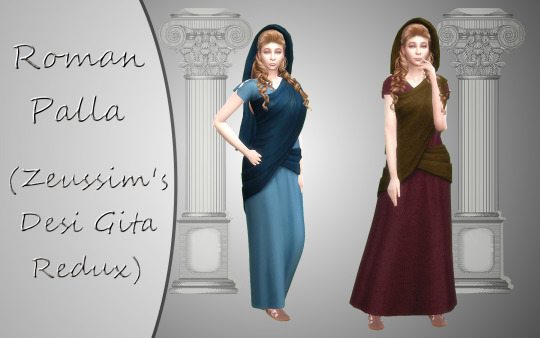
Roman Palla (Zeussim's Desi Gita Redux)
TSR's latest collection prompted me to finally finish a thing which was sitting in my WIPs' folder for months. I'd been hoping to make some more add-ons for it, but let's face it: I lost my steam halfway through, it's not happening, so the best I can do is to release it as is. Still pretty good, I hope!
As my GBSC playthrough is slowly but steadily approaching the Roman Britain era, I found myself in need for some outfits for my sim ladies. There's a bunch of stuff out there, but rather on the 'what we'd like Romans to have dressed like' side, not necessarily what history tells us about how they really dressed. Tbh I thought it was a hopeless endeavour, but then dear Buzzard directed me towards this amazing post by Zeussim - more specifically, the Desi Gita dress, which with a bit of imagination could work for a Roman palla. So I set off to work and romanised it even further. Big thank you to @buzzardly28 for the tip and to @zeussim for her generous ToU!
The mesh is slightly edited (cutouts on shoulders, adjusted headscarf position to accommodate a wider variety of hairstyles) and recoloured in my Iron Age palette, in two versions: 'silk' (or just any smooth textile, really)* or 'wool' (or anything rather on the coarse side). AND it comes with overlays - for both versions! Which means you can mix and match not only different colours, but different textiles as well. You're a well-off lady who just arrived in Londinum and is now freezing her butt off in the cold northern climate? No worries, put a wool palla over your pretty silk dress! Or you by some miracle managed to get your hands on one piece of silk? Wear it with you wool dress to a party to show off!
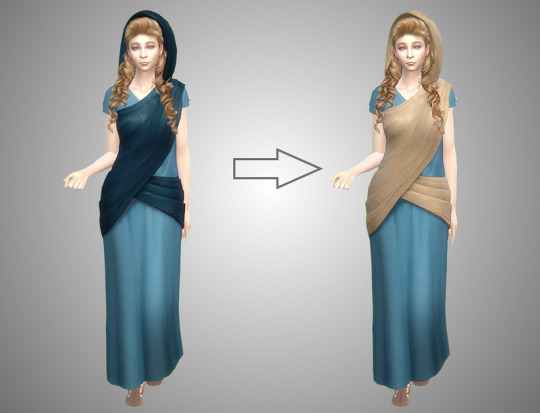
Many of the wool swatches, especially in combination with different pale/greenish overlays, work quite well for common folk:
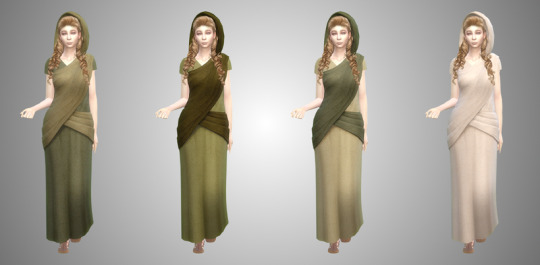
There's also an accessory fibula - pretty and golden (or silver), for the richer ones. Found somewhere on Sketchfab. (That's exactly where I got stuck - I wanted to make a variety of different ones, so that the poorer women would also have something to choose from... Alas).

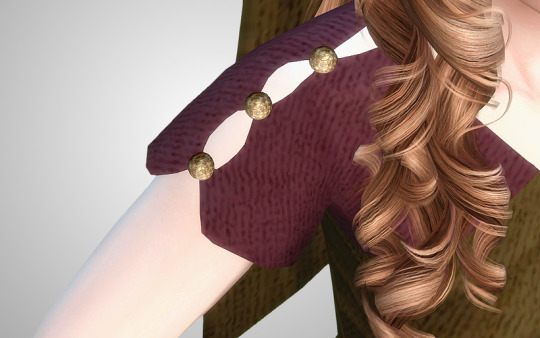
As always, all packages come in HQ (default) or non-HQ versions (for those of you who want to save some HDD space). Download only one per package!
If there are any other Roman era players out there: hope you enjoy :)
DOWNLOAD (free on Patreon, no ads or EA)
*OK, I feel like I have to add a little note: my quick research revealed that silk was insanely expensive for the majority of the Roman era. Like, 'only for the emperor and fams' level of expensive. Only at the end it became... emmm... 'cheap' enough to be accessible also to the aristocracy. So just pretend it is whatever the heck you want it to be, not necessarily real silk
197 notes
·
View notes
Text
So fucking excited for the next three episodes coming up just based of their titles
Episode 5, Trojan Horse,
Episode 6 Attila,
Episode 7 Chikhai Bardo
I’ve been thinking about what they might mean for the story, so I did a little dive into the titles, and honestly, this show is just top tier TV. It’s seriously gold.
we all know what a Trojan Horse is and what it represents YK harmless little thing that’s actually oh shit! a secretly trap or deception. I’m curious if this title points to a specific character or just the general theme of deception in the episode. I’m assuming it’ll likely tied to the Helena secret agent reveal, but thats just a guess
Now, Attila is the episode that has me the most hyped because I actually know who that is! Fir all I could know they are referring a different Attila or like a fancy chocolate brand but I doubt it
In very basic and simple terms, Attila the Hun was the leader of the Huns from 434 until his death in 453 AD. He wasn’t a leader in the stereotypical European king or Roman emperor way, but more like a war general and sovereign ruler to his people. That said, he did rule his people like any other king and was respected among his community as such. He is recognized as one of history’s most infamous conquerors, known for two major things: first, his ruthless military campaigns and borderline bloodlust behavior. The man did not play. Not only did he control a strong and loyal army with good numbers, but he was also a very skilled strategist, able to complete territory raids quickly and efficiently. Secondly, he is known for his raids on the Roman Empire. During this time, he earned the title “Scourge of God.” His attacks on the Roman Empire were eventually stopped after his failed invasion of Italy in 452 and his death in 453, but his raids had such a huge impact that they led to the demise and fall of the Western Roman Empire. They never really recovered from his attacks.

Eugene Delacroix 1847
In media, Attila is usually used to represent brutality and ruthlessness. For example, the only reason I even know about the guy is because of The Sopranos (Season 1, Episode 5). Tony is out of town visiting Meadow at college, and he later calls Carmella complaining about something I don’t really remember just being miserable about some shit and Carmella responds with,
“You’re not Attila the Hun, you know.”
And if that doesn’t convince you on how brutal Attila was, the second media reference about this guy that I can think of is literally from Dante’s Inferno.
Specifically in Canto XII of Dante’s Inferno, Attila is placed in the Seventh Circle of Hell, YK the circle reserved for those who committed acts of violence. The circle that is made up of murderers, tyrants, and warlords. Yeah.
So I wonder what’s that’s about. will say I’m expecting a major milchick crash out or who knows maybe even a proper mark s crash out. I like it when whimsical men get angry.
Now Chikhai Bardo is the one that interested me the most because I had no idea what that was had no clue what this was at first, but according to my research it’s a reference to Tibetan Buddhism beliefs in the afterlife?!???! swear to god you learn something new every day. I fucking love this show
with my very limited understanding of it. From what I’ve gathered , Tibetan Buddhism is a branch of Mahayana Buddhism, which emphasizes compassion and the potential for all beings to attain Buddhahood.
(Quick side note: if you didn’t know, Mahayana Buddhism is one of the major branches of Buddhism, often called the “Greater Vehicle”. It focuses on reaching the universal potential for enlightenment, with a strong emphasis on compassion and helping all beings achieve liberation/buddhahood)
Tibetans Buddhism blends in indian Buddhist traditions with local Tibetan practices. The religion focuses a lot on rituals, meditation, and the guidance of Lamas. Another thing about Tibetan Buddhism is that they believe heavily in reincarnation. This ties in with the episode title I swear
So the term Chikhai Bardo comes from Bardo Thodol which is the Tibetan Book of the Dead. The Bardo refers to the intermediate state between death and rebirth. And Bardo Thodol means “Liberation Through Hearing in the Bardo.” It is meant to be used for guiding the consciousness of someone who is dying, or someone who has just died, through the various stages of the bardo

(So this is the most used cover for the Tibetan book of the dead I couldn’t find who it was made by of if there were other covers so yeah. )
In the Bardo Thodol, there are three stages after death that determine your place in the afterlife. Chikhai Bardo is the first step in that process.
The Chikhai Bardo happens immediately after death, where the consciousness encounters the Clear Light of Reality (whjch based of my light internet skimming its supposed to be fundamental transcendent essence) a light that represents the true nature of reality. If the deceased can recognize this light they can can basically achieve enlightenment and escape the cycle of rebirth and reach Buddhahood never having to experience suffering again
If they don’t recognize the light, they can’t escape the cycle of rebirth and have to go through another round, facing the karma from their past life in this new one. This cycle continues until they finally attain enlightenment by recognizing the true nature of reality.
This concept is insane. Resurrection had been an idea the fandom has played with especially in relation to the Lumons cult like nature, and everyone’s obsession with keir spitting his writings off as scripture but throwing in enlightenment and rebirth is next level. And the idea that enlightenment can only be reached by realizing the true nature of reality is heavy as hell.
And I’m tellling you that episode is probably going to be crazy as fuck. Probably some trippy ass shit too y’all remember Defiant Jazz? That was Episode 7 in season 1. So yeah, this episode better be fucking crazy.
I can’t stop thinking about this show I’m basically living off breadcrumbs, but God, I love the attention to detail. I could just she’d a tear.
Also, this is a pretty rough and general overview of Tibetan Buddhism. I spent a very short amount of time doing some light skimming on the internet, so if I missed anything or got something wrong please for the love of god call me out. Same thing goes for Attila all the information I know about the guy is from a paper I wrote about him from like a year ago… anyways I love learning new shit like before this I didn’t even know there were different branches of Buddhism, so yeah the more you know!
Also some of the websites I used specifically for the Tibetan Buddhism stuff in case anyone was curious
Guide to the classics: the Tibetan Book of the Dead
Bardo Thödol | Tibetan Book of the Dead, Afterlife Guide | Britannica
https://www.samyeinstitute.org/nlncnd/the-six-bardos/
#severance#severance season 2#severance theories#breakdown#mark severance#helly r#mr milchick#idk man#prediction
30 notes
·
View notes
Text
I keep seeing Ides of March posts so I feel the need to point out some facts:
1 - first of all: his name wasn't JULIUS - he was Gaius Iulius Caesar
Romans (men) were given three names at birth: the first (called praenomen, basically how we think of first names today), the nomen (which was the name of the gens, meaning the "family"(/dinasty in the imperial age); and the cognomen which originally was basically a nickanme, and only later (republican period and imperial age) were passed down from father to son, even if it still reflected some (mainly physical) characteristics
for example the Emperor Caligola is so called because Caligola was his cognomen (because of a habit he had in his youth of wearing a specific type of shoes) - or Cicerone (= Cicero) which derived form one of his ancestor's physical traits
the cognemon is what most latin/roman people are known as today - just off the top of my head: Cicerone (Cicero), Caesar, Caligola (Caligula), Catullo (Catullus), Marziale (a poet),
so yeah, just thought I would bore you all with this short "history lesson"
2 - - he was not an emperor
I understand why people have the wrong notion that: Caesar was the first roman emperor - because, for thos who lear rushed roman history it goes something like: Caesar was murdered because he was becomign a tyrant, and then there was another civil war and his son (technically nephew but he was adopted so lets simplify this a bit, shall we?) took over as the first emperor
which. yeah. sort of
politics are a complicated thing tho
for those who didn't study roman history, here is a brief sum-up:
the roman republic (literally: res publica, meaning literally: public affair, or, from the ltieral words used in latin: thing of the people) has a series of institutions and roles, all of which were not a one-man-job, but of at least two people for mandate
there was, however, a specific position conferred by the consuls (dictator) which conferred unlimied power - even over the consuls - for a limitated period of time, usually given to go through a particualrly dire emergency; this usually lasted only six months, after which the power and higher title went bck to the consuls
Caesar was named Dictator, and only after the time limit on said postion was removed (and he was called dictator perpetuus) did his political enemies start to feel threatened - but he was never neither an Emperor nor what we nowadays consider a "tyrant" (which, as it happens, in my language is literally the translation of the latin word dictator, but it holds a completely different meaning from what romans used it for)
(for your information, after Caesar's assassination, the position of dictator was abolished and never revived)
if you keep being confused because Caes was, in fact, called imperator that is easily fixed: while (again, in Italian) imperator IS the word from which the title of imperatore (emperor) derives from, in latin it means, and was used for, the highest commander of an army, specifically someone who had won an important war/battle - which Caesar did with the conquest of the province of nowadays(roughly part of) France
#apologies if this sounds harsh#it is not meant to be#roman history#ides of march#julius caesar#caesar#gaius julius caesar#latin titles#roman republic#roman institutions#roman naming conventions#reality & co#history#historical facts
20 notes
·
View notes
Photo

First Crusade
The First Crusade (1095-1102) was a military campaign by western European forces to recapture the city of Jerusalem and the Holy Land from Muslim control. Conceived by Pope Urban II following an appeal from the Byzantine emperor Alexios I Komnenos, the Crusade was a success with Christian forces taking control of Jerusalem on 15 July 1099.
Around 60,000 soldiers and at least half again of non-combatants were involved in the First Crusade which set off on their quest in 1095. After campaigns in Asia Minor and the Middle East, great cities such as Nicaea and Antioch were recaptured, and then the real objective, Jerusalem itself. Many more crusades would follow, the objectives would widen, as would the field of conflict, so that even Constantinople would come under attack in subsequent campaigns.
Causes of the First Crusade
The first and most important action to spark off the fuse which would eventually burn down to the explosion of the First Crusade was the rise of the Muslim Seljuks, a Turkish tribe of the steppe. The Seljuks won significant victories in Asia Minor against Byzantine armies, notably at the Battle of Manzikert in ancient Armenia in August 1071. As a consequence, they gained control of such great cities as Edessa and Antioch and, c. 1078, the Seljuks created the Sultanate of Rum with their capital at Nicaea in Bithynia in northwest Asia Minor. By 1087 they had taken control of Jerusalem.
The Byzantine emperor Alexios I Komnenos (r. 1081-1118) realised the Seljuk expansion into the Holy Land was a chance to gain the help of western armies in his battle to control Asia Minor. Consequently, Alexios appealed to the west for soldiers in March 1095. The appeal was sent to the Pope Urban II (r. 1088-1099) who proved remarkably responsive, as did thousands of European knights.
Pope Urban II had already sent troops to help the Byzantines in 1091 against the Pecheneg steppe nomads who were invading the northern Danube area of the empire. He was again disposed to assistance for various reasons. A crusade to bring the Holy Land back under Christian control was an end in itself - what better way to protect such important sites as the tomb of Jesus Christ, the Holy Sepulchre in Jerusalem. Christians living there or visiting on pilgrimage also required protection. In addition, there were very useful additional benefits.
A crusade would increase the prestige of the papacy, as it led a combined western army, and consolidate its position in Italy itself, having experienced serious threats from the Holy Roman Emperors in the previous century which had even forced the popes to relocate away from Rome. Urban II also hoped to make himself head of a united Western (Catholic) and Eastern (Orthodox) Christian church, above the Patriarch of Constantinople. The two churches had been split since 1054 over disagreements about doctrine and liturgical practices. In case anyone was concerned, a campaign of violence could be justified by references to particular passages of the Bible and emphasising this was a fight for liberation, not attack, and that the objectives were just and righteous ones.
On 27 November 1095, Urban II called for a crusade in a speech during the Council of Clermont, France. The message, known as the Indulgence and aimed specifically at knights, was loud and clear: those who defended Christendom would be embarking on a pilgrimage, all their sins would be washed away, and their souls would reap untold rewards in the next life. Urban II then embarked on a preaching tour in France during 1095-6 to recruit crusaders, where his message was spiced up with exaggerated tales of how, at that very moment, Christian monuments were being defiled and Christian believers persecuted and tortured with impunity. Embassies and letters were dispatched to all parts of Christendom. Major churches such as those at Limoges, Angers, and Tours acted as recruitment centres, as did many rural churches and especially the monasteries. The call to “take the cross” - where people swore an oath to become a crusader and then wore a cross on their shoulder to proclaim their obligation - was an amazing success. Across Europe warriors, stirred by notions of religious fervour, personal salvation, pilgrimage, adventure and a desire for material wealth, gathered throughout 1096, ready to embark for Jerusalem. The departure date was set for 15 August of that year. Around 60,000 crusaders including some 6,000 knights would be involved in the first waves.
Continue reading...
19 notes
·
View notes
Text
@greatandquestionablecontent noted that my discussion of Paul and St Paul didn't touch on the latter's awful views on women and sexuality.
And while I very much hope those aren't relevant for our new Lyctor-ish buddy Paul, they very much do haunt the narrative of The Locked Tomb.
We get one in-world bit of theology in Gideon the Ninth: the Sermon on Necromancers and Cavaliers, which talks about how the Houses understand the relationship between necromancer and cavalier and god. And it's pretty much St Paul's Letter to the Ephesians, ctrl + F'd for necromancy, with a few other infamous Pauline verses thrown in for good measure, especially from 1 Corinthians:
A necromancer who must leave her House and fight requires a swordswoman./For this cause shall a man leave his father and mother, and shall cleave to his wife, and they shall be two in one flesh. - Ephesians 5:31
Our necromantic characteristics make us more like the Emperor...the necromancer and the cavalier are no different./[A man] is the image and glory of God; but the woman is the glory of the man. - 1 Cor 11:7
As [the Emperor] was once man, and became God...so were we dead and became alive./And as in Adam all die, so also in Christ all shall be made alive. - 1 Cor 15:22
Their love is the love that fears only for the other: the love of service on both sides. Some have tried to characterise this relationship as the cavalier’s obedience to the necromancer, but the necromancer must be in turn obedient to the needs of the cavalier without being asked or prompted: theirs is arguably the heavier burden./Loving one another with the charity of brotherhood, with honour preventing [anticipating] one another. - Romans 12:10 (I suspect this one is also meant to call to mind Ephesians 5's instructions for wives to submit to their husbands, while husbands are asked to love their wives like Christ loves the church - an instruction proponents of so-called Biblical gender roles will often describe in language similar to the Sermon as being the bigger ask.)
The love of the cavalier for the necromancer, and the necromancer for the cavalier...cannot be libidinous./But among you there must not be even a hint of sexual immorality, or of any kind of impurity...because these are improper for God’s holy people. - Ephesians 5:3
So cavaliership very much reproduces the gendered asymmetries of power found in many traditional Pauline-flavoured interpretations of Christian marriage.
But when you look at some of the invective around a romantic or sexual necromancer/cavalier relationship, it's coded rather more as homophobia.
The Sermon on Necromancers and Cavaliers hedges around explicitly condemning necro/cav relationships as specifically against the will of god, but makes it clear that's very much a view held within the Houses:
"after a myriad of thought about the matter, marrying your cavalier remains taboo at best. There have been those who have argued eloquently that it is traitorous to the ideals of the Necrolord Prime."
While St Paul isn't the only source of egregiously homophobic Bible verses, he's responsible for a good chunk of them, and the idea of this specifically defying the designs of God is a recurring theme...
It's worth noting that not all of what's generally described as St Paul's writing likely actually is. And Ephesians, which features so strongly here, is one of those "pseudo-Pauline" letters - a sort of Pauline fanfiction written to fill in perceived gaps or deal with issues as they arose.
But it feels oddly appropriate that the Houses' theology of gender cavaliership, itself an imitation of St Paul, is so strongly inspired by an imitation of St Paul...
119 notes
·
View notes
Text
Wikipedia article that is only available in Spanish. I translated into English some abstract to share here. I always wanted to write a post about that "Antonine dynasty" fallacy. Luckily I found someone who explains much better

Ulpia-Aelia Dynasty
Ulpia-Aelia Dynasty is the new name proposed by Alicia M. Canto and adopted by a sector of current historiography to refer to the seven emperors of the Roman Empire, from Nerva to Comodo. Specifically includes emperors Trajan, Hadrian, Antoninus Pius, Marcus Aurelius and his co-emperor Lucius Verus.
Doctrinal approaches
Unlike other dynasties such as the Julio-Claudian dynasty, the Flavian dynasty or the Severan dynasty, there is no agreement in Ancient History on how to group and name the emperors of the 2nd century, "the best century in the history of Humanity" according the British historian Edward Gibbon.
The most used definitions from the 18th century until today have been and are "the Antonines", "the Good Emperors" and "the Adoptive Emperors". There were only two Antonine: Marcus Aurelius and Lucius Verus, and both were, above all, two Aelii (from the Aelia family). The adoptions were just a political cosmetic operation, but they did not comply with the ideal principles of adoption described by Galba or Pliny the Younger.
The inappropriateness of these three universal classifications is more evident in the face of the 48 ancient texts that demonstrate that throughout that century there existed an authentic dynasty, of Hispanic origins and roots, whose real link was not the adoptions, but the line of blood and kinship, entrusted to the women of the dynasty, who transmitted the legitimacy to inherit the throne: Pompeia Plotina, Vibia Sabina, Matidia the Younger, and both Annias, the so-called Faustina the Elder and Faustina the Younger, ending in Commodus.
After the elderly Nerva as a necessary introducer, the following six emperors: Trajan, Hadrian, Antoninus Pius, Marcus Aurelius, Lucius Verus and Commodus - externi (foreigners) according to the Roman historian Aurelius Victor - form an authentic lineage.
All this led Maria M. Canto to propose the term "Ulpio-Aelia", "the Ulpii Aelii", to define the true dynasty of Hispanic origin that goes from Trajan to Commodus (98-192 AD). Some ancient authors, such greek historian Herodian, demonstrate that the Romans themselves did see Commodus as a direct descendant of Trajan, katá thêlugonía ("by the maternal line"), that is, through the aforementioned empresses, and as "A fourth generation emperor".
The reason why names such as "the Antonine dynasty" or "the Antonine emperors" have universally triumphed is not found in ancient texts, but in the European historiography of the 17th and 18th centuries, whose arguments in this sense, although they do not find real foundation in the texts, have been so generally accepted until now.
The new proposal has already been accepted by authors such as José María Blázquez, the Italian expert Anna Maria Reggiani, among others, and the definition can be seen integrated even in some university subject programs. Although, without a doubt, two and a half centuries of historiographic tradition is still very decisive in favor of the other definitions in use.
Alicia María Canto y de Gregorio (Havana, April 23, 1949 – Madrid, March 4, 2024), known as Alicia M. Canto, was a Spanish archaeologist and epigrapher. In 2011 she was appointed corresponding academic of the Royal Academy of History.
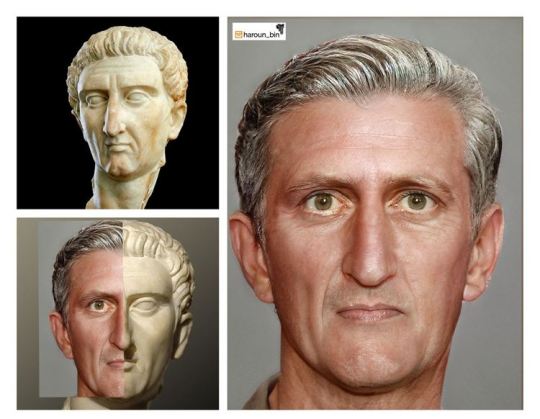
Nerva was chosen just as transitional ruler following the assassination of Emperor Domitian. Except him, the successors of "his dynasty" were related.
I'm really sick of hearing things such "Marcus Aurelius broke tradition by choosing moron Commodus just because he was his son; He made a serious mistake".
None of those emperors were chosen after going through a casting. Trajan's adoptive successor was his nephew, the only male relative he had, plus was married to Trajan's great-niece. Hadrian would have been emperor if Trajan had had a son? Marcus Aurelius and his wife Faustina were descendants of Trajan, he on his father's side and she on his mother's side. Marcus Aurelius did nothing more than continue the true tradition of his family.
Just as Augustus' dynasty is known as the Julio-Claudian, ending with Nero, Trajan's is the Ulpia-Aelia dynasty and ending with Commodus. And in my opinion the term Nerva Antonine dynasty, which I find in all English articles, simply doesn't make sense.
89 notes
·
View notes
Text
Gods of Antiquity: Doorway Gods

Source: https://johntsquires.com/2019/03/18/on-the-threshold-in-a-liminal-space/
Liminal gods, gods who preside over transitional states, such as from old to new, familiar to unknown, or unconscious to conscious, anything that requires moving from one state to another or crossing a threshold. Liminal gods may also cover more specific realms, such as agriculture or gods who die and rise again.
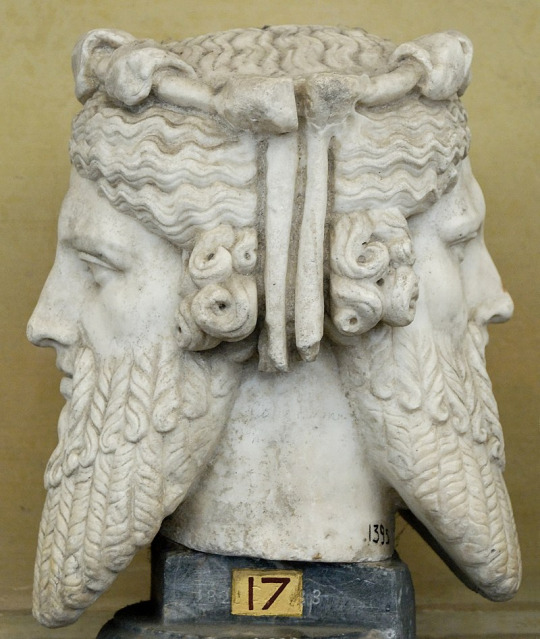
By Marie-Lan Nguyen (2009), CC BY 3.0, https://commons.wikimedia.org/w/index.php?curid=8962565
Perhaps the most widely known liminal god is Janus, the Roman god of gates, doors, doorways, beginnings and ends and from whom we get the name for January, a doorway into the year. To represent his nature, Janus is most often depicted as having two faces, one facing forward to view the future, one facing back, to view the past. He is one of the few Roman gods that did not descend from a Greek god, but most likely came from the Etruscan god Culśanś. The idea of transition is so intrinsically tied to Janus' being that his name means 'door' and one of his consorts, Jana, has a name meaning 'hinge' and was associated with arches and the moon, without whom, he could not perform his function. Jana is also equated to Diana, the goddess of the hunt, wild animals, fertility, and the moon. Macrobius, a 5th century Roman author who also equated Janus to Apollow, making them a sun/moon pairing.
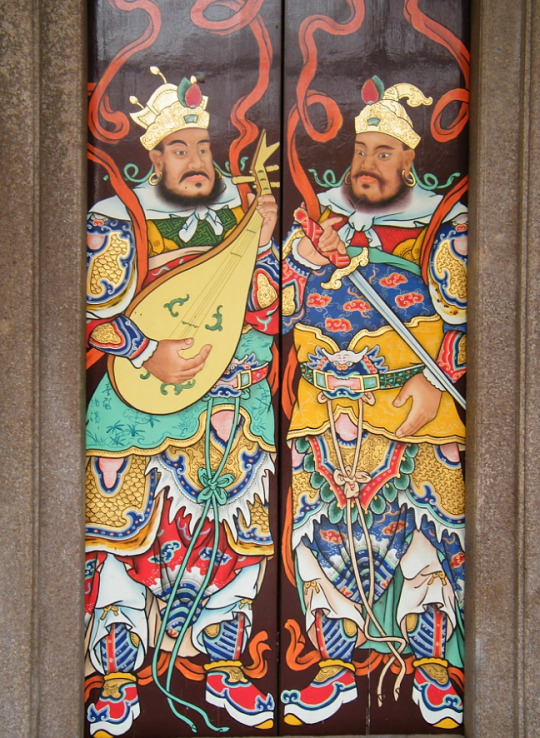
By Ixioini - Own work, CC BY-SA 3.0, https://commons.wikimedia.org/w/index.php?curid=11229578
Another door god is Menshen 門神 from Chinese mythology. Menshen are a pair of deities (Shenshu 神荼 and Yulü 鬱壘) that also guards gates and doorways, protecting them against evil influences and allowing positive influences into the home. They are responsible for punishing evil spirits by feeding them to tigers after tying them to reeds. Their story involves protecting the Jade Emperor from the spirit of the Dragon King after the Dragon King was killed for disobeying a direct order. His generals Qin Shubao and Yuchi Gong volunteered to watch his door. In order to free up the generals, he had their likenesses painted and placed on the doors. It is now traditional to change those paintings on the Chinese New Year.

Source: https://yokwe-yokai-of-korea.fandom.com/de/wiki/Munshin
Munshin 문신 is the Korean gods of doors. The first recorded door deity is Cheoyong, who protected his wife from the sexual acts of a disease deity. His image was hung to repel disease in the kingdom of Silla. Another tradition follows from the Taoist tradition where statues were used instead of or in addition to images.
#gods of antiquity#liminal gods#doorway gods#janus#menshen#munshin#roman mythology#chinese mythology#korean mythology
8 notes
·
View notes
Note
could you talk more about constantinople university?
Hey, I am sorry for the very late reply. This past week was very difficult. Anyway I assume you are asking about the main educational institution in Constantinople at the times of the Byzantine (Eastern Roman) Empire.
First of all, I should start this by saying a few basic things about the educational system in the Byzantine Empire. The Byzantine Empire had the best primary education in Europe and one of the best in the known world at the time. All peasant children were able to receive education, that is, both boys AND girls, which was unheard of in most other places. As a result peasant men and women attained a satisfactory level of education for the standards of the time.
Higher education was received mainly through private tutoring, which means that this was in fact a privilege of the rich and upper middle classes. Private tutors could also be hired by women who, even though they could not work in professions of a high academic profile (except they could become doctors for women), were still able to educate and improve on themselves just for the sake of it.
The University of Constantinople
When the Roman Empire was spilt in two in 395 AD, the Hellenized eastern part of the empire already had a few famed schools in some of its greatest cities (i.e Academy of Athens, the schools in Alexandria, Antioch, Beirut, Gaza). Those remained the hotspots for higher education for a few centuries, mostly until the Arab conquest in the 7th century.
In 425 AD Emperor Theodosius II founded the state funded Pandidakterion (Πανδιδακτήριον) in the Capitolium of Constantinople, what is supposed to be the original form of the University of Constantinople. According to some sources the concept of this school was actively supported by Theodosius's sister Pulcheria and his empress wife Aelia Eudocia the Athenian. The Pandidakterion was not exactly a university in the modern sense; it initially did not offer courses in various fields of sciences and arts from which students could choose their studies and career. The Pandidakterion's aim was to train specifically those who pursued a career as civil servants for the administration of the Empire and the secular matters concerning the Church. The courses taught were: Greek Grammar, Latin Grammar, Law, Philosophy (students were taught Aristotle and particularly Plato) and Rhetoric (with an emphasis in Greek rather than Latin rhetoric). That last one was considered the most challenging course. Pandidakterion did not teach Theology; this was the responsibility of the Patriarchal Academy. There are sources which list the Pandidakterion indeed as a university though and perhaps it is the closest thing to a university you could have gotten that early in time.
Meanwhile, in Constantinople and other large cities of the empire there were various academies of theology, arts and sciences but those were not universities. Also, as stated above, it was after the 7th century that Constantinople became the center of Byzantine higher education. In the 7th and the 8th century the Byzantine empire was attacked by Slavs, Arabs, Avars and Bulgars, loosening the focus to education. All this and the Iconoclasm seemed to have had adverse yet non permanent effects on the function of the university. The dynasty of the Isaurians (717 - 802) renamed "Πανδιδακτήριον" to "Οικουμενικόν Διδασκαλείον" (Ecumenical School).
The 9th century signifies a new prosperous era for higher education. There are some conflicting sources for that time - according to some the Pandidakterion was moved to the Palace of Magnaura and according to others this is an erroneous conflation of the Pandidakterion in the Capitolium with the new University of the Palace Hall of Magnaura (Εκπαιδευτήριον της Μαγναύρας). Whatever the case is, this renovated or entirely new school was founded by Vardas (842 - 867), uncle of Emperor Michael III. Mathematics, geometry, astronomy and music were added to the courses. The school then was managed by Leon the Mathematician (790 - 869) from Thessaly. Studying there was free.
In the 10th century, Emperor Constantine VII Porphyrogennitos promoted the Pandidakterion and supported it financially.
In 1046 Constantine IX Monomachos reformed the actual Pandidakterion of the Capitolium into two large faculties operating in it; the "Διδασκαλείον των Νόμων" (School of Law) and the "Γυμνάσιον" (Gymnasion). The School of Law retained its purpose to train the civil servants whereas the Gymnasion taught all the other sciences (i.e philosophy, mathematics, astronomy, music). At the time Pandidakterion had a clear resemblance to a typical university. The principal of the Law School was called "Νομοφύλαξ" (nomophýlax), Guard of Law. A notable nomophylax was Ioannis VIII Xiphilinos (1010 - 1075) who was an intellectual, jurist and later Patriarch of Constantinople. The principal of the Gymansion was called "Ύπατος των Φιλοσόφων" (Consul of the Philosophers). Notable Gymnasion principals were Michael Psellos (1018 - 1078), one of the most broadly educated people to have lived in the Byzantine empire or the middle ages even. Psellos was a Greek monk, savant, courtier, writer, philosopher, historian, music theorist, poet, astronomer, doctor and diplomat. He was notoriously horrible at Latin although given the extent of his studies it is unclear to modern historians whether his Latin knowledge was genuinely poor or he played it up as an act of disdain (he was totally the type to do that). Another notable principal was Ioannis Italos (John the Italian), a half-Italian half-Greek from Calabria, who was Psellos' student in classical Greek Philosophy.
The function of the Pandidakterion as well as all high education in the Byzantine Empire was ceased after the capture of Cosntantinople by the Crusaders in 1204. The Byzantine royalty did however survive through the small Empire of Nicaea and they supported financially the private tutors. After the liberation of Constantinople by the Byzantines in 1261, there were efforts to restore the higher education institutions. Michael VIII Palaeologos, the emperor who recovered the city, reopened the university and appointed as principals Georgios Akropolitis, a historian and statesman, for the Law School and Georgios Pachymeris, a historian, philosopher, theologist, mathematician and music theorist, for the Philosophy School (Gymnasion).
However, the University never returned to its previous status and smooth function. It slowly passed fully under the Church's management in order to survive, while the rest of the teaching was again done by private teachers. This was the case all the way to the Fall of Constantinople to the Ottoman Turks in 1453. Only one day after the capture of Constantinople, Sultan Mehmed II founded a madrasa as the primary educational institution of the city. Madrasa is an arabic name for an Islamic higher education religious institution. In 1846, this insitution was reformed into a university in the likes of the typical Western European universities. Until 1930 many old sources referred to this university confusingly as "University of Constantinople" because the city's name had not actually changed until that time. However, this institution was not the same to the Pandidakterion, the university of the Byzantine Age. In 1930, the city's name was officially changed from Constantinople to Istanbul and the university was renamed in 1933 to "Istanbul University" and it operates like this, being the first university of the Republic of Turkey.
What about the Pandidakterion though, the first University of Constantinople? Well, it ceased to exist, unlike the Patriarchal Academy which re-opened one year after the Fall of Constantinople, in 1454, refounded as the Phanar Greek Orthodox College, which operates to this day.
*Forgive any potential inaccuracies, some sources were really conflicting, especially about the possible Pandidakterion and the Magnaura School mix up.
#history#middle ages#byzantine empire#eastern roman empire#byzantine history#greek history#constantinople#anon#ask#long text
18 notes
·
View notes
Text

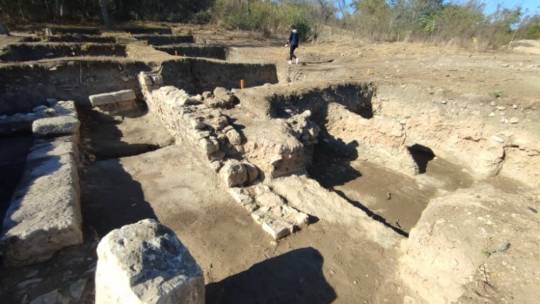
Archaeologists Discovered Roman Floor Mosaics in Bulgaria
Archaeologists discovered floor mosaics with early Christian designs and nearly 800 artifacts in the archaeological reserve of Marcianopolis in Devnya, in the northeastern part of Bulgaria.
The Roman town of Marcianopolis (present-day Devnya) in northeastern Bulgaria appears to have originated as a Thracian settlement. It was later inhabited by Hellenized settlers from Asia Minor and named Parthenopolis.

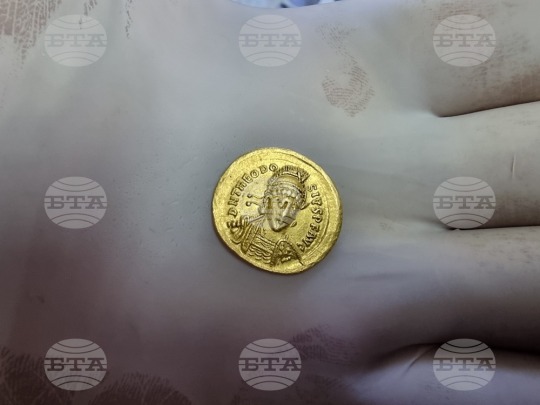
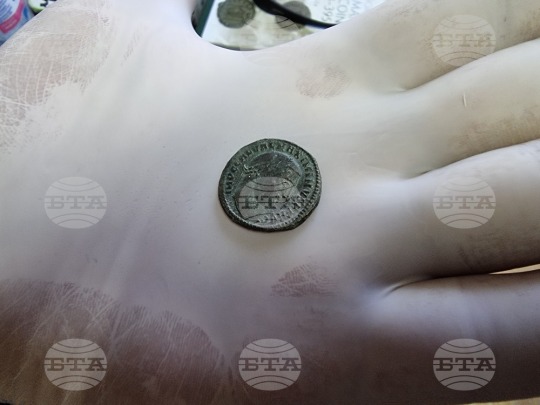
Roman Marcianopolis was established around 106 CE, following Trajan’s campaigns in Dacia to the north. The settlement was named after his sister, Ulpia Marciana. At the crossroads between Odessos (modern Varna), Durostorum, and Nicopolis ad Istrum, as well as the location of plentiful springs, Marcianopolis became a strategically important settlement.
Diocletian’s administrative reforms in the late third century CE divided Moesia Inferior into Moesia Secunda and Scythia Minor, with Marcianopolis serving as the former’s administrative capital. Marcianopolis experienced its most prosperous period during the middle of the fourth century CE. From 367 CE to 369 CE, the eastern emperor Valens used Marcianopolis as his winter quarters during campaigns against Visigoth incursions in the region. During this time, it served as the Eastern Empire’s temporary capital.

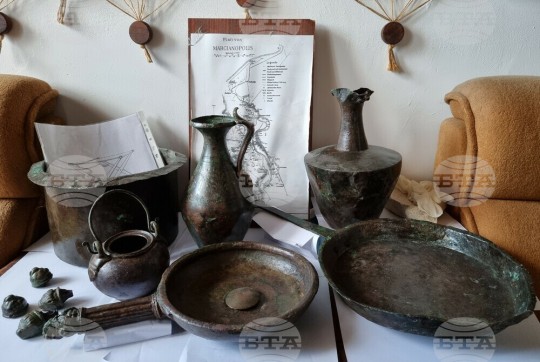

Floor mosaics with early Christian designs were found in the remains of a building. Archaeologists are not yet sure whether it was a public building or it belonged to a rich Roman citizen.
The tentative dating of the mosaics is in the first half of the 4th century AD.
The finds from the current archaeological season in Devnya contain another thousand bronze coins, several clay lamps and two clay vessels, which are awaiting scientific processing and restoration.
During the past archeological season, researchers restored bronze vessels discovered in the 1990s in a brick-walled tomb dating to the late 2nd – early 3rd century.
The vessels had a ritual use and were related to the personality of the person buried, Mosaic Museum director Ivan Sutev said in a statement to BTA.
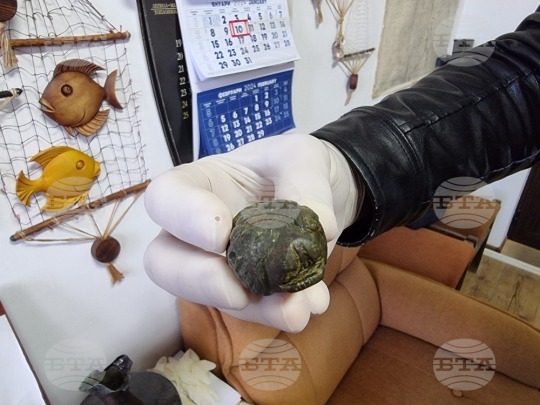

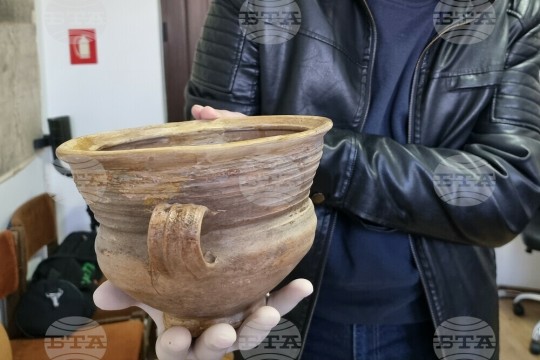

They are richly decorated and the workmanship is exquisite, he added. The find includes a vessel for pouring liquids as offering to a deity, and a wine jug with a trefoil mouth (oenochoe). A simple kitchen pan was also found along with these. All this leads archaeologists to suggest that a Roman citizen of Marcianopolis may have been laid to rest in the tomb, but that he may have had more specific functions: a soldier, a cook, or even a priest, Sutev said.
Pottery that was discovered in the basilica’s environs during excavations in 2023 has since been restored. Among these are a mortarium vessel for liquids and an exquisite crater-shaped pot for liquids. These were located in the structure with the mosaic floors. Coins from the time of Emperor Theodosius II were also found scattered on the floor.
In 447, Attila’s Huns captured and destroyed Marcionopolis after conquering the entire Balkan Peninsula but failing to capture Constantinople. That is determined by 20 gold coins scattered on the floor of the building being studied. On one side of the coins is an image of Theodosius II, while on the other is the patron goddess of Constantinople. Among the coins discovered during the Marcianopolis excavations were those from the city’s founding in the second century. The latter are dated to the sixth century, around the time of Emperor Justinian.
By Oguz Buyukyildirim.
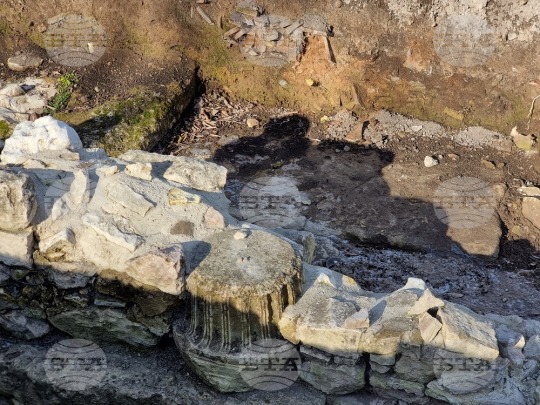
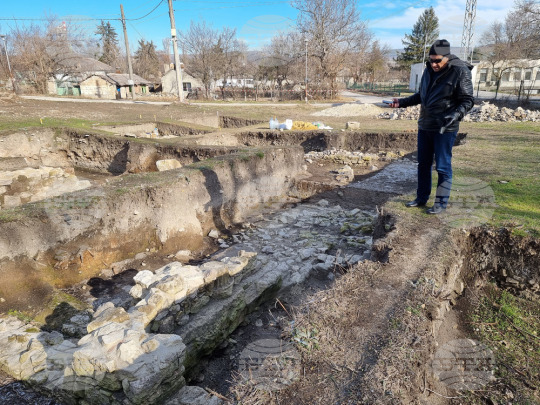
#Archaeologists Discovered Roman Floor Mosaics in Bulgaria#The Roman town of Marcianopolis#gold#gold coins#roman gold coins#ancient artifacts#archeology#archeolgst#history#history news#ancient history#ancient culture#ancient civilizations#roman history#roman empire#roman art#Emperor Theodosius II
44 notes
·
View notes
Text
This is a paper I wrote for one of my courses about media and materiality. I will use any excuse to write on The Hunger Games. My instructor actually liked it, asking why I didn't write anything on Snow lmao. Maybe for part two, David. Don't encourage me. I also want to say that the responses on my post regarding the names in THG helped so fucking much. Thank you to those people who interacted with that post!
Disclaimer: this assignment was meant to be informal for us so we wouldn't feel too overwhelmed with the studyload, so there is some non-academic register in here.
Panem et Circenses: The Forecast of a Mass Culture Storm
In a world long ago, the Roman poet Juvenal critiqued the people of Rome for discarding their responsibilities as citizens. While Sejanus tried to overthrow the Emperor Tiberius, Juvenal claimed that the people only cared to lavish in food and frivolities, saying that “the mob / That used to grant power, high office, the legions, everything, / Curtails its desires and reveals its anxiety for two things only, / Bread and circuses” (Juvenal ll. 78-81). Juvenal’s phrase “bread and circuses” is often referenced in relation to “mass culture to denote a process of social decline” (Brantlinger Bread and Circuses 22). The Roman Empire had a method of appeasing the masses to avoid uprisings: keep them fed and offer them entertainment (23). Similarly to Juvenal who disapproved of this manner of ruling, socialist scholars and avant-garde artists criticized mass culture for subjecting civilization to this numbing of critical thinking (Brantlinger “Mass Media” 99). The twentieth century knows an incredible rise of technological developments and mass production of consumer goods which has led to several social developments, e.g. the blurring of class distinctions and an increase in literacy (100, 103). Although these may seem as positive effects, mass culture threatens to silence individuals into commodification, as happened to the Romans (Dubord 14). Juvenal had forecasted the enslavement of people to mass-produced consumable goods and, looking at contemporary times, it seems we are left standing in the rain without an umbrella. Yet, this is not the worst mass culture has to offer. A flood of dystopian stories in the literary world has predicted and warned us for far crueler storms, depicting oppressive governments that have gradually dominated their citizens through bread and circuses.
One of these stories is The Hunger Games (THG) by Suzanne Collins. Set in a futuristic United States, renamed ‘Panem,’ THG depicts a picture of mass culture at its extreme. Panem is divided into twelve districts, each responsible for the production of a specific good. These products are the sole reason the districts are still considered as relevant for the Capitol, the oppressive government. While the majority of the districts suffer from poverty, the Capitol lavishes in the districts’ importations of food and other materialities. Collins depicts the duality of abundant, capitalist consumerism with the contrast between the riches of the Capitol and the scarcity of the districts. The Capitol has managed to keep the districts sedated through fear; they are coerced into complacency through strict regulation and the annual Hunger Games. Seventy-four years before the original events of THG, the thirteen districts rebelled against the Capitol but were violently defeated. As punishment, District Thirteen was completely obliterated and the remaining twelve districts were forced to send a male and female tribute between the ages of twelve and eighteen to the Games where they would have to fight to the death in an arena as entertainment for the Capitol. The twenty-four tributes are randomly selected and can place their name in the reaping multiple times in exchange for tesserae, a year’s supply of grain and oil. Households that could not afford food could make bread from the tesserae. Collins draws a connection to ‘panem’ in Juvenal’s phrase through the tesserae system which is a method for the Capitol to keep the districts dependent on the government’s supply of basic needs, like bread.
Juvenal’s ‘circenses’ is apparent in two elements in THG. The first is the Hunger Games themselves which are meant to entertain the Capitol’s citizens. Before the Games there are interviews with the tributes and various television segments. The coverage of the tributes has two purposes: to show the Capitol’s citizens how well-fed the tributes are in the Capitol, a kindness offered to them by the very institution that places them in a position of death, and to obtain sponsors during the Games who will send necessities to the tributes in the arena, e.g. medicine or water. The second reference to ‘circenses’ is the character Peeta Mellark. Peeta is the male tribute from District Twelve and the baker’s son. His first name is a reference to pita bread, and as the baker’s son, he is also a clear connection to ‘panem.’ Moreover, he once gave bread to Katniss, the female protagonist, when she and her family were at the brink of starvation. The loaf of bread symbolized hope and sparked a new motivation in Katniss to live again (Collins THG 37). His surname is a shortened version of ‘malarkey,’ meaning “silly behaviour or nonsense” (“malarkey”), similar to the contents of circuses. Peeta is not a seasoned fighter and his chances of winning the Games are low. However, the Games can be played either through fighting or entertainment. Peeta is incredibly charismatic and uses that to his full advantage whenever the cameras are around to gain sponsors (Collins THG 158). He is, like the Capitol, both a provider of food and entertainment.
Where the Capitol symbolizes fear, Peeta represents hope. As an oppressive government, the Capitol’s goal is to silence people into complacency so they do not rise against the authorities, as the Roman Empire. This is the opposite for Peeta who, in the sequel Catching Fire, uses his likeability among the citizens of the Capitol to defy its very government (Collins 289). Throughout the trilogy, he has consistently used his abilities to both provide and perform for noble causes that concern the people, not the government. When Peeta gave Katniss the bread, he gave her renewed hope to live again which was more sustainable than the Capitol’s tesserae supply that merely lasts a year and is only given in exchange for a bigger chance at death. Peeta’s hope was free. THG serves as a warning for a future that is ruled by mass consumption and production which blinds citizens to the dictatorship they are governed by. Juvenal’s faraway world of the Roman Empire is not so far away after all, it has always been here and is gradually taking over our future. But, we know what is coming and we can prepare for the storm and find shelter. As Peeta’s character shows, there is hope, a possibility, to provide for each other rather than depend on authorities that prefer to see us as commodities, to use the government’s very own methods against it and become individuals once more.
Works Cited
Brantlinger, Patrick. “Introduction: The Two Classicisms.” Bread and Circuses: Theories of Mass Culture as Social Decay. Cornell University Press, 1985, pp. 17-52.
---. “Mass Media and Culture in Fin-de-Siècle Europe.” Fin-de-Siècle and Its Legacy, edited by Mikuláš Teich and Roy Porter, Cambridge University Press, 1990, pp. 98-114.
Collins, Suzanne. Catching Fire. Scholastic Ltd, 2011.
---. The Hunger Games. Scholastic Ltd, 2011.
Debord, Guy. “The Commodity as Spectacle.” The Society of the Spectacle, translated by Ken Knabb, Bureau of Public Secrets, 2014, pp. 13-20.
Juvenal. “Satire X – The Vanity of Human Wishes.” Poetry in Translation, translated by A. S. Kline, 2001, https://www.poetryintranslation.com/PITBR/Latin/JuvenalSatires10.php. Accessed 14 Dec. 2023.
“malarkey.” Cambridge Dictionary, https://dictionary.cambridge.org/dictionary/english/malarkey. Accessed 14 Dec. 2023.
#the hunger games#thg#suzanne collins#the ballad of songbirds and snakes#tbosas#katniss everdeen#peeta mellark
26 notes
·
View notes
Note
OH MY GOD THE POLLEN FIC ?????? Good lird my heart is broken into many pieces. the POVs so good!! Darren going through the gender hells™️!! And the anxiety of not knowing whether your loved ones will wreck you for it!! God!!
Man Apollo’s is a great balance between being able to tell he’s toxic and also desperately needs to go to therapy and also hit by stuff not under his control but also not doing enough considering the things he DOES have under his control MAN he’s so INTERESTING AUAGH!! and like!! The thing Will said about knowing that his dad would always eventually do what he should, even if he takes some time, because he loves them WHEN HERE HE’S AVOIDING DOING JUST THAT EXACTLY it’s so cool to be able to see how he’s changed so specifically! also is the nonce tgol’s Commodus bc goddamn I know Apollo doesn’t kill him in this universe but if he did brother I’d be cheering and whooping FRRR. literally when I read those bits I wanted to shake Apollo by the shoulders and yell ‘you are a victim!! You’re a victim!!’. i sincerely hope he gets to clock said nonce in the face!
ALSO also idk if this spoilers or not but I’m so interested to find out how the situation has changed so Darren’s feelings about being reduced to Apollo’ “wife” are resolved somehow when they DO get married (either this or I’m a fool who can’t put two and two together): is it more of a focus on his gender specifically, where people see him very much as a guy now (enthusiastic)? Do the press just dgaf about him and Apollo moreso now (very enthusiastic)? Is it that he’s more established in archery that people solidly know him as a coach and don’t generally reduce him to Apollo’s partner at large (maybe??)?
anyway I hope you’re having a great day and week!!
AHH THANK YOU SO MUCH <33
apollo has seriously always been one of my FAVORITEEE characters to write even when it was just the memoir, but going into early twenties apollo's head??? it's some wild shit going on thereJSDF he's dealing with a LOT and definitely not in the best ways and he is so not aware of most of it while being overwhelmingly aware of other stuff. it's just a total mess and it pains me whenever i write it knowing that one day this will turn into memoir!apollo and he will look back on all of these days with regret </3 he truly is toxic as hell but can we even blame him???? that's a question i still don't actually know (but darren would say yes)JSDFJ
"also is the nonce tgol’s Commodus bc goddamn I know Apollo doesn’t kill him in this universe but if he did brother I’d be cheering and whooping FRRR" JSDFJDSF DAMN U GUESSED IT okay so like. i didnt wanna make his ex's actual name commodus bc like. bro who names their kid commodus and also that'd be too unrealistic but (spoiler for future memoir excerpts!) i plan to have apollo not out his ex by giving him a name of an ancient roman emperor. and he chooses commodus. the guy who drowns in his bathtub. he's petty like that :)
"is it more of a focus on his gender specifically, where people see him very much as a guy now (enthusiastic)? Do the press just dgaf about him and Apollo moreso now (very enthusiastic)? Is it that he’s more established in archery that people solidly know him as a coach and don’t generally reduce him to Apollo’s partner at large (maybe??)?"
it's a mix of all of these things! for one, darren is fully transitioned now and when he would be marrying apollo, he would be recognized as apollo's husband. also gay marriage is legal in america atp so like that can actually happen. (which was def a factor for darren, bc at that time he literally wouldn't be able to be recognized as male and also as married to apollo in the us). the press/media has definitely shifted its focus a bit from apollo and darren (though they are obviously still there sometimes) and overall is much less homophobic & transphobic & misogynistic (don't get me wrong, it still 100% is, but like, slightly better!! small steps!!)
and ofc, he's just... grown up. he's abt 3 years older than apollo so they obvi weren't children by any means when they were dating, but apollo was,, well. we know how apollo was. and darren was lazer focused on the olympics. since all that's happened, he's been able to mature and live for *himself* rather than a medal for a much longer time, and reprioritize some things in his life. plus the fact that he's not actively aiming for a medal/competing in the olympics leaves a lot more room/time in his life to open up to the idea of being married.
but also like. they've given it over a decade. they're still in love with each other. i'd say that's reason enough for them to get married finally - long story short, 2004 was wrong time, but 202[insert year] is right time :)
thank you for the ask!! <3
5 notes
·
View notes